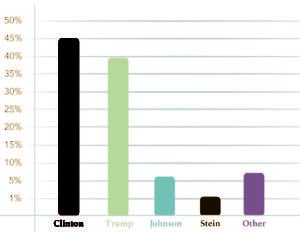![]()

In comparison to the 2008 and 2012 elections, many Americans consider voting third party a viable option, as reported by the Wall Street Journal.
Frustration with the two major party nominees has left many wondering if a third party vote is a valid option.
“If someone is moved by their conscience to vote for a third party, that seems like reason enough to vote that way. But a third party candidate hasn’t received one electoral vote since 1972, so in terms of actually voting for a candidate that can win the election, it’s unlikely such a candidate would come from a third party,” Daniel Bennett, professor of political science at John Brown University, said.
Although it is unlikely for a third party to win, some JBU faculty and students don’t think a vote for a third party is wasted.
“Obviously, a vote for a third party candidate counts just as much as a vote for a major party candidate.
But in terms of influencing the outcome of a presidential election, voting third party is unlikely to make a substantive impact.
It isn’t necessarily wasted vote, though, especially depending on the person’s motivation to vote third party,” Bennett said.
Sophomore Tiffany Aguirre believes a third-party vote is valid “because you vote for who you want to vote for. When people say, ‘if you vote third party, you’re just losing a vote for Trump or losing a vote for Hillary,’ who cares? You don’t want them in office anyway.”
However, not everyone feels this way.
“I mean sure you can vote for a third party if you want, I don’t care, but you’re not helping anyone win. Might as well not vote. It just makes you feel better because you voted,” sophomore Beck Oakes said.
“Now if you ask me my opinion on the fact that our system is set up so third parties have zero chance of winning, that’s another thing entirely,” she followed up.
Although some may consider not voting at all, Bennett believes voting is a privilege that should be exercised in some way.
“I encourage people to vote in every election, since it’s an opportunity not everyone has. But nobody is obligated to vote for president. People can still vote for their congressional representatives and senators, as well as for state and local offices. In many ways, those are the offices that [affect] people more directly anyway,” he said.
Third party candidates for the 2016 election include Libertarian Gary Johnson, Green Party candidate Jill Stein, Constitution Party candidate Darrell Castle, among others who are on less than 20 state ballots.




